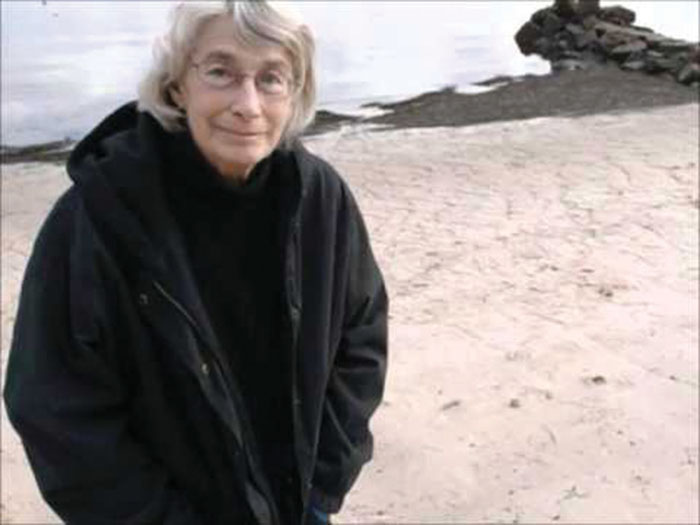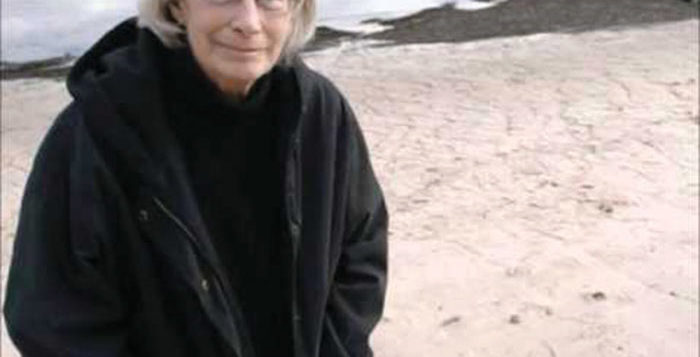MARY OLIVER (1935–2019) was famously private and accustomed to her ways of working as a poet, writing often about how she walked with pad and pen at dawn every day through the woods and along the shoreline of Provincetown, and later in Hobe Sound, Florida. Years ago, when I was an editor at Country Living magazine, a glossy Hearst title, I wanted to have her contribute a personal essay. Working through her publisher, I was told that Oliver was wary of a magazine so commercial and that she didn’t use the fax (yes, I’m dating myself) and wouldn’t respond to email. Eventually, I was told that she would write a piece, but insisted on hand-delivering the finished essay to me at New York’s 92nd Street Y, where she was scheduled to make an appearance.
Prior to the reading, amid a crowd of Birkenstock-clad, gray-haired fans with PBS tote bags, young lesbians sporting multi-colored hair, and other fans of all ages and persuasions, she graciously handed me a sealed envelope. She shook my hand and said with genuine modesty: “I hope that what I wrote is good enough.”
As a longtime reader of hers, I felt as if Sappho herself had waded from the Aegean to hand me new verse on a scroll. I waited until the public reading was over before opening the envelope and looking at the manuscript on Lexington Avenue. With a close friend of mine, writer Lee Stern, looking over my shoulder, the moment I read the first sentence of the typed manuscript, I was filled with delight and awe. She wrote about her early years in Provincetown with her partner Molly Malone Cook, and how poor she was in money, but how wealthy in her love of the landscape she inhabited.

Oliver was never afraid to use certain words in her poems. Cover your ears, for you may be offended. Her language includes nouns and adjectives like beautiful, love, beloved, prayer, loneliness, God, holy, and heaven. She regularly used just such decidedly accessible, non-academic words in her poems, ones that may seem blasphemous in contemporary poetry. They came from the pen of a woman who taught at Bennington College, was a lesbian, wrote scholarly essays on Poe and Whitman and Hopkins, and derided figures like former Secretary of Defense Donald Rumsfeld in poems.
Her poems included images of chirping birds and receding ocean tides, lilies bobbing in the sun, soon to be dissolved onto the tongues of cows and hovering hummingbirds seeking nectar. Even her stanzas appear well-balanced and harmonious on the printed page. And while her poems always present a mélange of meanings, rarely does a reader leave one of her works baffled or frustrated.
That Oliver was able to use such language repeatedly revealed that she may have been America’s most confident poet. Most confident poets are those with tenure, but she had had a contract that guaranteed her better work security: an adoring public. And she kept her public satisfied; depending on how you count chapbooks versus full-length collections, she wrote some 37 books of poetry, essays, and writerly advice.
Although she was among the most read and recognized of poets, being named U.S. poet laureate eluded her. Long known for her wariness in appearing at too many public readings (though she was no recluse, given her teaching and the many workshops she led, based on her inspiring A Poetry Handbook), Oliver was a regular sell-out (in quantity of fans, not quality of poems) when she took to the podium. She appeared on more than one occasion at the 92nd Street Y (Young Men’s Hebrew Association, not to confuse it with its Christian counterpart), the Mount Olympus (or Sinai) of literary life. At the event I attended, fans called out to her, as if at a rock concert, to read some of her iconic works, the most requested being “Wild Geese,” which has rightfully earned a place in many an anthology.
Oliver and Cook had been a couple for more than forty years, and Oliver continued to write poems about an enduring grief and sadness at Cook’s death—though her poems are, ultimately, always optimistic, even flamboyant and reverential in their celebration of what is beautiful in nature, yet another reason for her success and popularity. Thirst (2006) was the first volume to address her grief and perplexity at the parched state of loss. Although readers could infer that subsequent love had come into her life, her A Thousand Mornings (2007) still referenced such lingering turmoil. In that volume’s poem “Hurricane,” she writes of both a real, wind- generated one, as well as “the other one … of a different sort, and lasted longer. Then/ I felt my own leaves giving up and/ falling. The back of the hand to/ everything.”
In the book’s namesake poem, which describes a night where “my heart makes its way/ however it can over the rough ground/ of uncertainties,” she cites her belief that the night is always “overwhelmed by morning,” a time “for redbird/ to sing.” That redbird makes another colorful flight in her 2008 book, Red Bird, where she writes as the first stanza: “Red bird came all winter/ firing up the landscape/ as nothing else could,” concluding that “I am grateful/ that redbird comes all winter/ firing up the landscape/ as nothing else can do.”
A Thousand Mornings, one of my favorite books of hers, may take only a couple of mornings to read, but its imagery resonates far longer. Much of the imagery and subject matter in those 36 poems will be familiar to those who know Oliver: dreams, of which there were many, of her beloved dog Percy; foxes, garden snakes, white herons; a soliloquy about the meaning of prayer. In every one of her books, she wrote poetry that was accessible but that also presented enough ambiguity to keep you rereading. She wrote poetry both joyful and sorrowful, optimistic and realistic. While she revisited familiar themes, nothing was truly predictable from volume to volume. I heard her words read live, and I can still hear her voice when reading them on the printed page.
David Masello is an essayist and feature writer on art and culture based in NYC.






